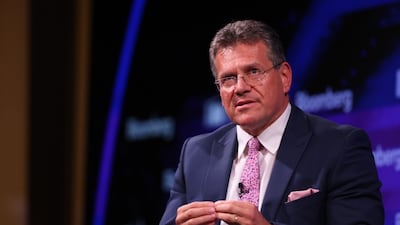The recent resignation of European Union climate chief Frans Timmermans to run in a Dutch election has triggered the promotion of his former colleague, Maros Sefcovic, 57, a Slovakian politician praised this year for leading a diplomatic breakthrough over Northern Ireland.
The veteran commissioner, already a European Commission vice president, moves up to the post of executive vice president for the European Green Deal.
One of the longest-serving politicians in Brussels, Mr Sefcovic, who speaks English, French, Russian and German in addition to his native Slovakian, was appointed education and culture commissioner in 2009.
He will also – on a temporary basis – have the responsibility of overseeing the commission's climate action policy until a Dutch commissioner is appointed.
Mr Sefcovic is viewed as a competent problem-solver in Brussels, where he has spent close to two decades, first as part of his career as a Slovakian diplomat, and then within the commission.
But it remains to be seen whether he will be as strong an advocate for Europe's ambitious climate policies, known as the Green Deal, as the high-profile and energetic Mr Timmermans.
The commission has so far not clarified whether he will attend a United Nations climate summit, or Cop28, which will take place in November in the UAE. Ursula von der Leyen, the commission's president, is expected to be present.
Mr Sefcovic on Tuesday wrote on X, formerly Twitter, that: "It is an honour to continue rolling out the #EUGreenDeal, with a strong focus on our industries and our citizens."
The choice of Mr Sefcovic, a social democrat like Mr Timmermans, to become one of three executive vice presidents preserves the political and gender balance of the commission's college.
Representing the EU in Dubai later this year would normally have been the responsibility of Mr Timmermans, who is widely viewed as a climate expert and keen to push hard on implementing politically sensitive environmental policies.
Last year, he succeeded at Cop27 in getting the EU to signal that it was open to a loss and damage fund to help victims of climate disasters around the world.
This is a key demand from the Global South where many argue that the West is largely to blame for fuelling climate change with its rapid industrialisation in recent centuries.
Mr Sefcovic, who is viewed as less invested in climate issues and more to the right of the social-democrat group than Mr Timmermans, might be harder to convince on issues like climate finance, said Joseph Dellatte, a climate research fellow at the Institut Montaigne think tank in Paris.
Yet he might also be the EU's best bet as elections approach and senior figures such as Mr Timmermans and colleagues, including heavyweight competition commissioner Margrethe Vestager, seek other jobs.
"There are not many options on the table for Ursula von der Leyen," Mr Dellatte told The National.
Mr Sefcovic, a career diplomat, is also highly respected by his colleagues in Brussels.
Before he joined the EU's executive arm, he held various senior positions in the Slovakian Ministry of Foreign Affairs, including ambassador to Israel in 1999. He failed in an attempt to be elected president of Slovakia in 2019.
Mr Sefcovic enjoys a positive reputation for his work on successfully negotiating a trade dispute with the UK after Brexit that risked inflaming tensions in Northern Ireland.
Announced in February by Ms Von der Leyen and UK Prime Minister Rishi Sunak, the Windsor Framework eased trade issues between Northern Ireland and Britain that had been caused by the potential return of a hard border on the island of Ireland after the UK's departure from the EU in 2020.
Mr Sefcovic, who oversaw the EU side of the negotiations that lead to the new agreement, was appreciated by his peers for his problem-solving skills as he repeatedly called for finding "creative solutions".
The Windsor Framework includes a new system to manage the flow of goods at ports in Northern Ireland. Last month, the UK's House of Lords found that the new framework was an improvement, although some issues remain.
Among Mr Sefcovic's achievements is the overseeing of the EU's efforts at joint gas purchasing, which became a top priority after Russian's invasion of Ukraine in February last year.
The bloc, which previously imported 40 per cent of its gas via Russian pipelines, has dramatically reduced its dependency on Moscow, and last week touted its ability to fill its gas reserves ahead of winter at more than 90 per cent capacity.


